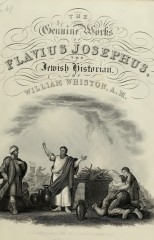
Author : Josephus Titus Flavius
Title : The complete works of Josephus Complete and unabridged
Year : 1870
Link download : Josephus_Flavius_-_The_complete_works_of_Josephus.zip
Introduction. Flavius Josephus (A.D. 37–c.100) is the author of what has become for Christianity perhaps the most significant extra-biblical writings of the first century. His works are the principal source for the history of the Jews from the reign of Antiochus Epiphanes (B.C. 17–63) to the fall of Masada in A.D. 73, and therefore, are of incomparable value for determining the setting of late inter-testamental and New Testament times. Josephus, born the son of a priest, was named Joseph ben Matthias (Joseph, son of Matthias). Being of a priestly family and a descendant of the Hasmoneans, he was well educated and rose to a respected position in the Jewish community. After a short association with the Essenes and a somewhat longer period as a disciple of an ascetic hermit named Banus, he decided at the age of nineteen to join the Pharisees. When he was twenty-six (A.D. 63) he traveled to Rome and successfully pleaded for the release of some fellow priests who had been sent there to be tried by Nero. As a result of the visit, he returned profoundly impressed by the power of the empire and strongly opposed the Jewish revolt against Rome in A.D. 66—being convinced of its ultimate futility and fearing the consequences for his nation. Being unable to restrain the rebellion, he reluctantly joined it and assumed a command in Galilee where he fortified a number of cities, stored up provisions, and trained his army in anticipation of the arrival of Vespasian and his forces. By the spring of A.D. 67, Josephus and the little that remained of his army had been forced to retreat to the fortified city of Jotapata where he eventually surrendered. During his subsequent imprisonment, Josephus became directly acquainted with and gained the favor of Vespasian. When Vespasian became emperor in A.D. 69 through rather extraordinary circumstances, Josephus was officially freed. He returned to Jerusalem with Titus, Vespasian's son and future emperor, where he served the Roman commander as interpreter and mediator. Faced with the inevitability of the Roman forces' ultimate victory, Josephus attempted to convince the Jews holding Jerusalem to surrender and thus save the city. He was, however, unsuccessful and in A.D. 70, the city fell to the Romans and was demolished. After the destruction of Jerusalem, Josephus returned to Rome with Titus and settled there as a client of the emperor on an imperial pension—gaining the rights of a Roman citizen and adopting the emperor's family name, Flavius—and began his literary endeavors. His first work, The Wars of the Jews, was written to give a general history of the wars from the time of the Maccabees to the Great War with Rome which resulted in the final demise of the nation of Israel. Josephus' eyewitness account of the last years of resistance and particularly of the destruction of Jerusalem by Titus are most valuable to a proper understanding of those events. Josephus' other major work and his longest, The Antiquities of the Jews, published some twenty years later, was written primarily for the benefit of the non-Jewish world. It is a history of the Jewish nation from earliest times (he begins with an account of the biblical creation narrative) to Josephus' own time and was intended to demonstrate that the Jews enjoyed an even greater antiquity than did the Greeks. The work draws heavily from the Septuagint (the Greek version of the Hebrew Scriptures) and extrabiblical traditions as well as the writings of Greek and Roman historians. His autobiography, The Life of Flavius Josephus, was published as an appendix to the Antiquities and was written primarily to defend himself and his war record against the unflattering portrayal given in the work of another Jewish historian, Justus of Tiberias. Against Apion is a short and eloquent apologetic for the Jewish faith in contrast with various aspects of Greek thought. ...

Palmer Michael - Hiroshima revidiert
Author : Palmer Michael Title : Hiroshima revidiert Die beweise für napalm und senfgas anstatt...














